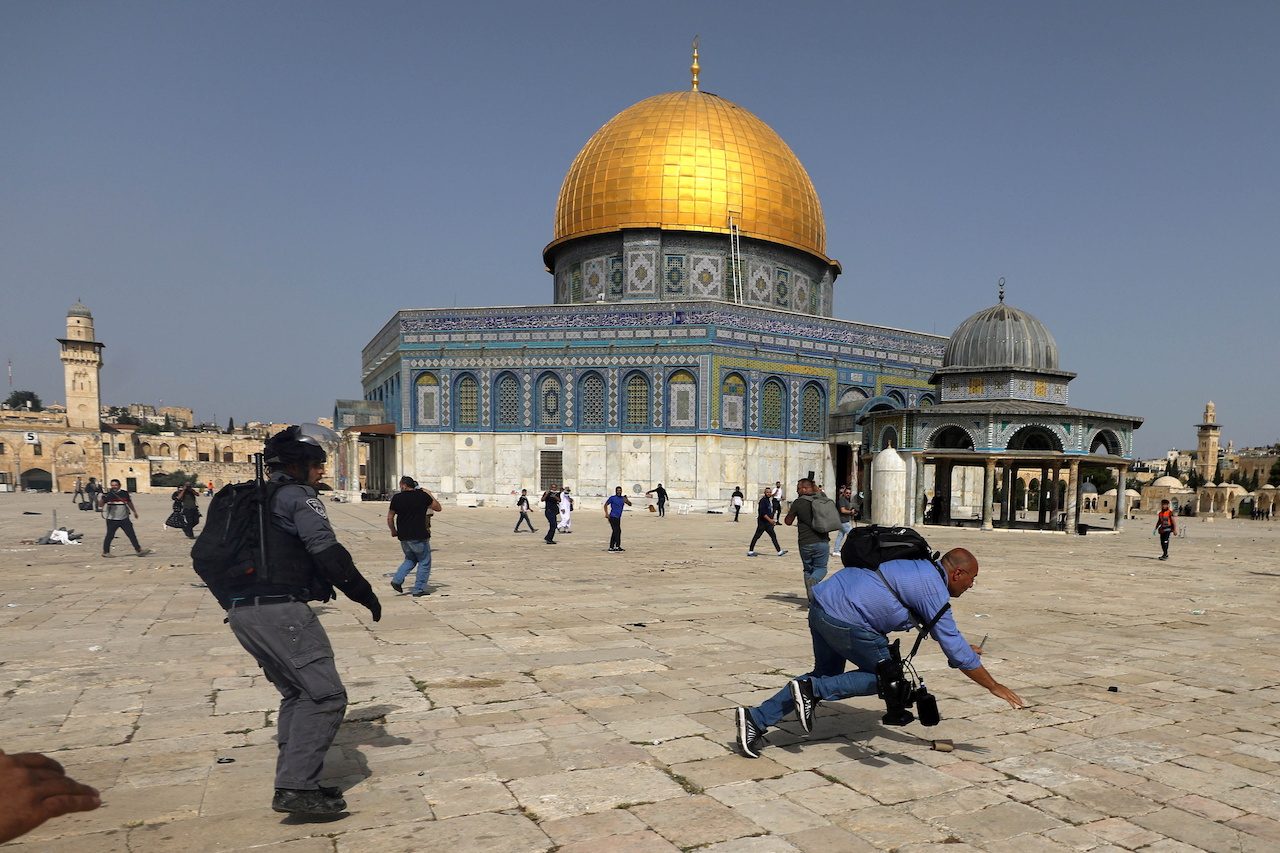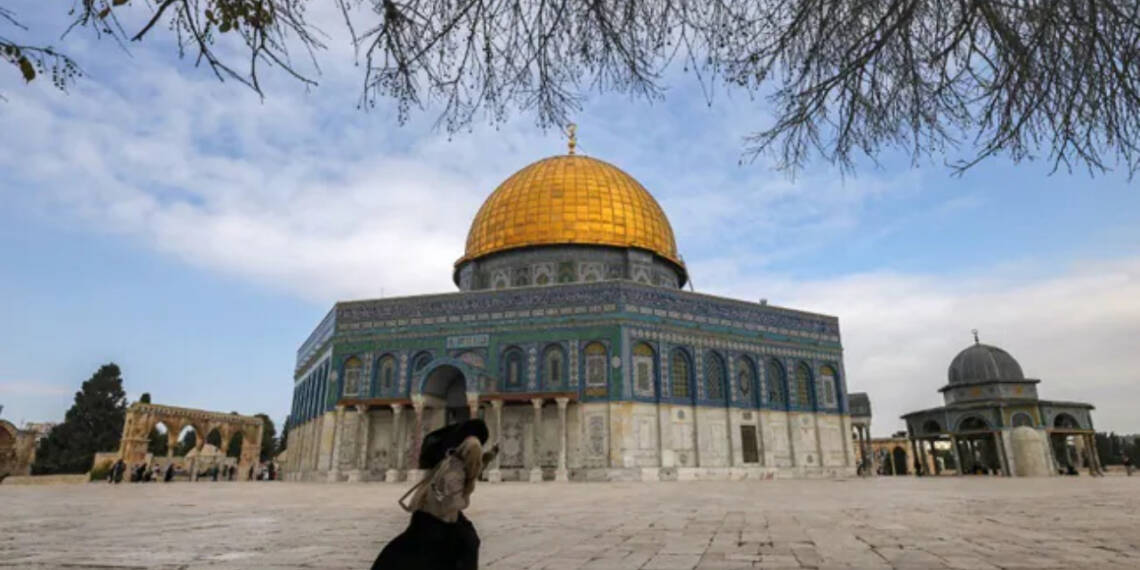In the heart of the ancient city of Jerusalem, nestled amid narrow cobblestone streets and bustling markets, stands the Al-Aqsa Mosque, an architectural marvel that has witnessed centuries of reverence, conflict, and spirituality. This revered sanctuary holds a tale that transcends time, weaving together the threads of religious devotion and political strife.
Ancient Reverence
Centuries ago, the foundations of Al-Aqsa were laid, giving birth to a place that would become the third holiest site in Islam. Muslims believe that the Prophet Muhammad, on his miraculous Night Journey, ascended to the heavens from this very spot. Throughout the ages, pilgrims from distant lands traversed deserts and mountains to bow their heads in prayer within the sacred walls of Al-Aqsa. Its golden dome gleamed under the Middle Eastern sun, reflecting the spiritual fervour of the faithful. But, there’s more than meets the eye. The site holds a contentious history.
The Al-Aqsa Mosque holds significance for Jews as well due to its historical and religious connections. According to Jewish tradition, the Mosque is located on the Temple Mount, known as Mount Moriah in the Bible. This site is believed to be where Abraham offered his son Isaac as a sacrifice, as recounted in the Book of Genesis. Later, it became the location of the First Temple, built by King Solomon in ancient times.

The First Temple was destroyed by the Babylonians in 586 BCE, leading to the Jewish exile. After the exile, the Second Temple was constructed on the same site and became the center of Jewish worship. However, in 70 CE, the Romans destroyed the Second Temple during their conquest of Jerusalem, an event commemorated as Tisha B’Av in Jewish tradition.
The Western Wall, or Wailing Wall, which is part of the retaining wall of the Second Temple, is a significant Jewish holy site today. It is believed to be the closest accessible point to the Holy of Holies, the inner sanctum of the Temple where the Ark of the Covenant was kept.
While Al-Aqsa Mosque is primarily a Muslim site, its historical connection to the ancient Jewish Temples makes it a place of importance in Jewish history and religious heritage. This shared historical significance adds to the complexity of the religious and political tensions surrounding the site.
Centuries of Turmoil
As empires rose and fell, Al-Aqsa stood resilient, a testament to the unwavering faith of generations. However, its history was marred by strife. Crusaders sought to claim its sanctity, leading to bitter battles and loss of life. Subsequent centuries witnessed shifting powers, from the Ottoman Empire to the British Mandate, each leaving an indelible mark on the mosaic of Al-Aqsa’s history.
Modern Turmoil and Conflicts
In the 20th century, as nations were born and borders were redrawn, the fate of Jerusalem, and by extension Al-Aqsa, became a focal point of tension. The creation of the state of Israel in 1948 led to conflict, and the status of Jerusalem remained a contentious issue. In 1967, after the Six-Day War, Israel gained control of East Jerusalem, including the Old City, sparking protests and concerns about the fate of Al-Aqsa Mosque.

The Conflict Between Three Nations
The conflict surrounding the Al-Aqsa Mosque has a ripple effect that extends far beyond the borders of Israel and Palestine. At the center of this turmoil is not just a physical structure but a symbol, a spiritual heart, and a focal point for multiple nations, each with its own stake in the issue.
Jordan’s Role as Custodian
Jordan is deeply invested in the Al-Aqsa Mosque due to its historical and religious significance. The Hashemite Kingdom considers itself the custodian of Islamic holy sites in Jerusalem, including Al-Aqsa. This custodianship is rooted in Jordan’s historical ties to the city and its status in the Islamic world. Additionally, Jordan shares a strong sense of solidarity with the Palestinian people, many of whom are culturally and religiously connected to Al-Aqsa Mosque. Jordan’s active involvement in preserving the mosque’s sanctity reflects its commitment to safeguarding the religious heritage of Jerusalem and supporting the Palestinian cause. The kingdom’s role serves as a diplomatic and cultural bridge, ensuring the protection of Al-Aqsa and maintaining regional stability.
Palestinian Aspirations and Israeli Sovereignty
The conflict between Palestine and Israel over Al-Aqsa Mosque is a focal point of the Israeli-Palestinian dispute, reflecting deep-seated historical, religious, and political tensions. For Palestinians, Al-Aqsa Mosque represents an essential symbol of national identity and religious heritage. They view any perceived threats or provocations, such as visits by Israeli settlers or politicians, as violations of their rights and sovereignty in East Jerusalem, which they consider the capital of their future state. The mosque’s significance is entwined with the Palestinian struggle for self-determination, making it a rallying point for their cause.
On the Israeli side, Jerusalem holds immense religious and historical significance, particularly the Temple Mount, where Al-Aqsa is situated. Israelis see Jerusalem as their eternal and undivided capital, rooted in ancient Jewish history and religious texts. The control and sovereignty over Al-Aqsa Mosque are contested due to the religious beliefs and narratives of both Israelis and Palestinians. This struggle over the site often leads to clashes and tensions, highlighting the complexities of finding a peaceful resolution in the region. Al-Aqsa Mosque’s status remains a critical issue in any peace negotiations, reflecting the broader challenges faced in achieving a lasting and just resolution to the Israeli-Palestinian conflict.

Current Scenario
Today, Al-Aqsa Mosque stands amidst a region marred by conflict. Clashes between Palestinian worshippers and Israeli security forces have become tragically familiar scenes, echoing the tumultuous history of this sacred site. The political tensions surrounding Jerusalem, especially the Old City and Al-Aqsa, remain a significant obstacle to peace negotiations between Israel and Palestine.
In recent times, the situation has remained tense. Incidents of unrest, often triggered by perceived threats to Al-Aqsa’s sanctity, continue to flare up, leading to sporadic confrontations. The international community watches with bated breath, hoping for a resolution that respects the religious sentiments of all parties involved while fostering an environment of peace and understanding.
The tale of Al-Aqsa Mosque continues to unfold, a story of faith and conflict, of devotion and discord. As the world grapples with the complexities of this cherished site, the hope remains that one day, the echoes of prayers within its walls will resonate in harmony, symbolizing a shared commitment to peace and coexistence in this sacred land.
Watch More:







